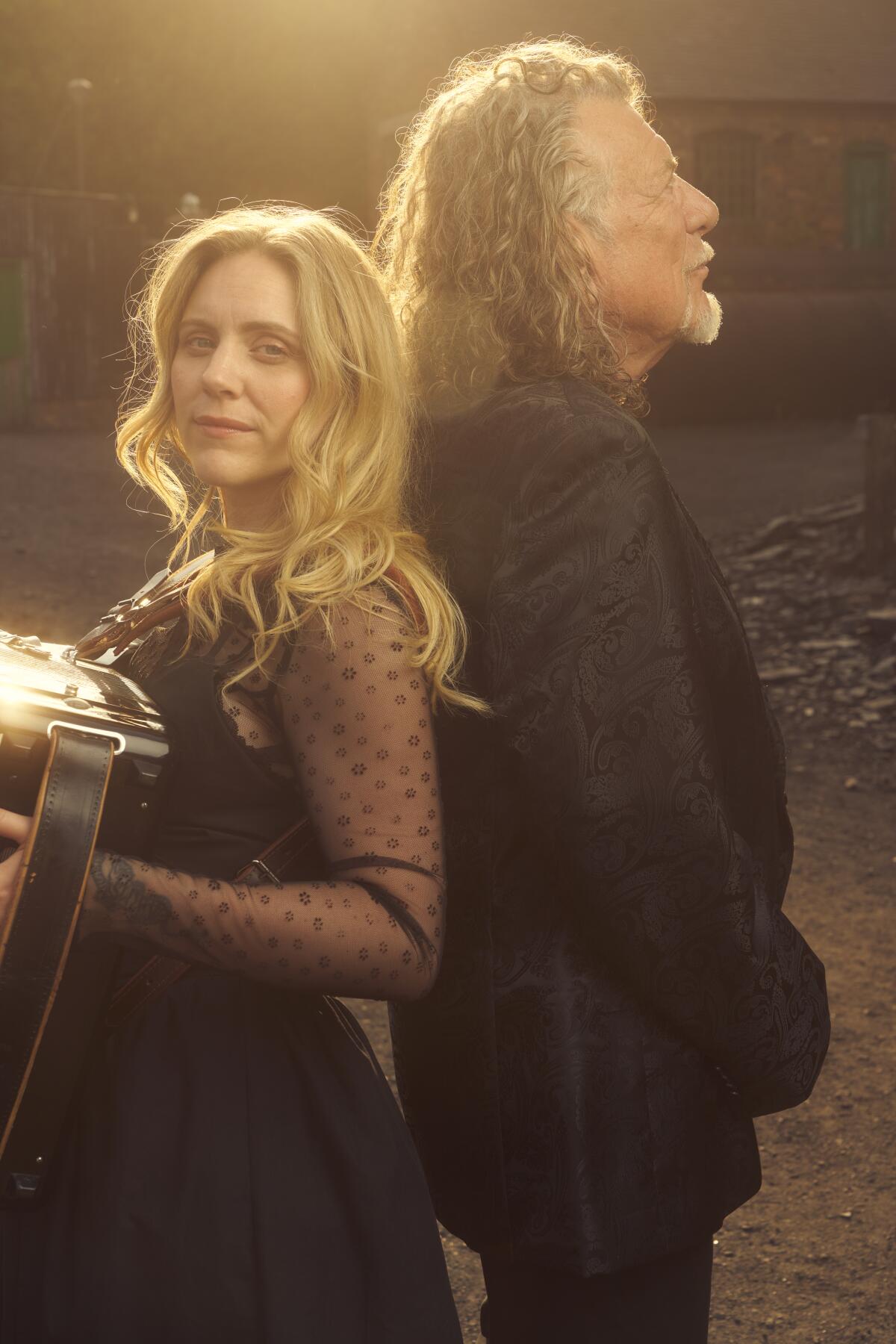
Robert Plant reflects on his long career, starting as a teenager in 1960s England. He remembers the thrill of discovering new music before it became popular – when bands were still largely unknown. Before reviews or widespread recognition, that mystery allowed fans to form their own ideas and excitement about what the artist might be like.
The musicians accompanying Robert Plant on his Saving Grace tour – and featured on the album of the same name (credited to “Robert Plant with Suzi Dian”) – are a talented but largely undiscovered group. Because of delays caused by the pandemic and rehearsals in remote parts of England and Wales, this lineup had time to develop a unique and captivating sound.
The album “Saving Grace” features twelve songs, including traditional tunes and covers. These range from “Gospel Plough” (a song also recorded by Bob Dylan) to “I Never Will Marry” (famously sung by the Carter Family and Linda Ronstadt), and even a unique take on Donovan’s “Chevrolet” – which itself draws from older blues songs by Memphis Minnie and Kansas Joe McCoy. Each song has been carefully studied, creatively reinterpreted, and skillfully rebuilt.
Plant enjoys having the freedom to explore his creativity. He recalls his earlier days recording with Atlantic Records and his friendship with the legendary Ahmet Ertegun, praising Ertegun’s talent and influence on the music scene. Plant jokingly remembers releasing a particularly unusual album called ‘Shaken and Stirred,’ which he says was almost the end of his career, as everyone questioned his decision.
Robert Plant remembers going to Ahmet Ertegun’s office for coffee, where Ertegun pointed out, ‘This record doesn’t have any guitar solos.’
You know, I was listening and realized the guitarist was basically mirroring Richie Hayward’s drumming – playing all the same notes! It was like he was filling in the spaces between the verses with the fiddle part, just following the drumbeat. It was a really interesting connection, and I immediately noticed it.
“He said, ‘This is really fine, man. But why don’t you put the band back together?’
I remember saying to Ahmet, ‘You know, you really do, don’t you?’ It just brought back all those times when everyone was obsessed with his hair – constantly pointing out his mullet! It was a whole thing, honestly.
Plant explains that he didn’t feel too old when John Bonham died. He felt he was still young enough and had the energy to continue on with his life and career.
When I was young, before and during my time with Zeppelin, my friend and I were always looking for opportunities – what people in England call ‘Chancers.’ So, I felt like I was continuing that spirit when I decided to move forward. I really carry a part of him with me wherever I go.

Looking back, the days of high heels and strict expectations are over. I decided I was going to do things my own way, and fortunately, people joined me, which is what we have now. With ‘Saving Grace,’ we’ve really pushed boundaries – I’ve taken a big step and fully committed to this new direction.
The album evokes a deeply touching feeling, creating a sense of ongoing human connection. It feels both classic and relevant, perfectly capturing the complexities of our current moment.
Plant describes a special connection he feels with this particular group of musicians. It’s a feeling of discovery and shared joy, something different from the usual inspirations he draws from. He explains there’s a bittersweet happiness in their music, and that the way they stretch out notes and play live really brings this feeling to life.

It’s dinnertime, and Plant is calling from his hotel. After grabbing a bite to eat nearby, he’s heading to a pub quiz to test his general knowledge. He prefers to keep things relaxed and stay close to home. When we spoke, he was reflective, modest, and, as he put it in one of his songs, he’s at a point in life where he’s simply done his best.
Living in Austin, Texas, felt a bit too public for Robert Plant. He admits it’s hard to complain about success, saying most musicians would welcome people enjoying their work. It’s a strange situation, he acknowledges, but ultimately a pleasant one.
Returning to his home country was incredibly moving, particularly experiencing the landscape again. He felt a sense of welcome from the hills, mountains, and rivers, which inspired a song on his last album with the Sensational Space Shifters, called ‘Embrace Another Fall.’ That song really captures how he was feeling at the time, and he’s still excited about it. He finds joy in the current season – the rain, the cozy atmosphere, and being able to visit the pubs.
And the singer’s drink of choice at his local?
“Everything, always,” he quips.
Plant often remembers childhood car trips through beautiful scenery. He recalls seeing genuinely misty mountains, a sight that recently reminded him of a similar experience. While staying in Wales, he woke up to a misty coastline and witnessed around 2,000 Canadian geese landing – a moment that instantly inspired him creatively.
Coming back to the U.K., I unexpectedly started working with this incredible group of people. It was magic – everything just clicked! I quickly realized this was something special, something we needed to protect. It felt so precious, I wanted to keep it just between us, a little secret we shared.
Matt Worley, a banjo and string player, started the band “Saving Grace” by connecting with Robert Plant at a pub. He brought in singer Dian, who then asked her husband, Oli Jefferson, to play drums. Guitarist Tony Kelsey and cellist Barney Morse-Brown completed the group. Despite being younger than the 77-year-old Plant, Worley turned out to be a great musical partner.
Worley was immersed in traditional English folk music from a young age, and when he met Robert Plant, he didn’t act like a starstruck fan. Plant was surprised to find Worley was deeply familiar with artists like the Incredible String Band, Bert Jansch, and Sandy Denny. Plant explains, “He wasn’t someone who just played covers in a pub band. Matt could do that, but he had a broader range.” Plant was particularly impressed by Worley’s genuine passion for the music.
You know, Plant also casually mentioned that the guy was surprisingly mature, really funny, incredibly smart, and, let’s just say, enjoyed a good drink. It was a really charming little detail.

In “Saving Grace,” Robert Plant is still getting used to the subtle cues within the band’s music. He explains that he often doesn’t understand the silent communication between Matt and Suzi – like when they use a finger signal to decide who takes a particular musical part. He admits he’s often left thinking, “Wow, I didn’t see that coming!”
Luckily, Robert Plant received help from Alison Krauss, a bluegrass and country singer who also plays the fiddle, while working on two albums. She suggested, “I enjoy the time we’re spending together, but maybe we should try singing the same song as a duet?”
“I said, ’What are you referring to?’”
“She said, ‘Well, how can we harmonize if you keep changing the melody?’
I explained that the magic of singing in harmony is when your voices really connect. She looked at me, raised her eyebrows, and simply said, ‘Yeah.’ It was a pretty amusing moment.

Robert Plant describes collaborating with his partner, Dian, as both challenging and deeply rewarding. He admits it’s unsettling starting a musical project without fully knowing how creatively open the other person will be, requiring patience and adaptability. He explains that while Dian is a skilled music teacher with a strong technical understanding of harmony, she effortlessly finds the perfect musical fit when they work together. This is particularly evident in their versions of traditional songs like “As I Roved Out” and the Moby Grape song “It’s a Beautiful Day Today,” where Plant and Dian’s voices blend to create a warm and uplifting sound.
Plant believes that despite coming from different eras, backgrounds, and cultures, all songs share a common thread. He describes it as everyone being ‘on the same ship,’ and praises Suzi’s voice as a beautiful addition that creates an interesting contrast. He feels these songs resonate across time, and they’re simply adding their own touches to them. Plant sees the current intimate tour, with over 25 dates in the US and England, as a perfect fit for Saving Grace, a band he describes as having a special connection and enjoying where they are, without striving for larger ambitions.
 ×
× As I’ve been listening to him talk about his career, it struck me how he sees it like a really long honeymoon – starting way back in ’99. He’s had incredible musical partners over the years, from playing with Ali Farka Touré out in the desert to just hanging out and chatting with Buddy Guy. He feels like he’s earned a kind of ‘pass’ now, a global access to collaborate with anyone. He admits he’s not always completely confident, but he’s always giving it his all to make the music work.
Robert Plant says his recent work, “Saving Grace,” has been personally revitalizing. He admits he hasn’t felt inspired to write truly original material since a 2021 collaboration with T Bone Burnett on “Raise the Roof.” He feels overwhelmed by the complexities and uncertainties of the modern world, making it difficult to find a solid foundation for songwriting. While he can still write lyrics, he doesn’t believe they fit the kind of music he wants to create.
Revitalizing his classic songs has been a real benefit, especially now when many people feel that once we overcome current challenges, we need to celebrate with music. Even though Robert Plant acknowledges he won’t be performing forever, he’s passionate about continuing to reimagine and record his songs, finding joy in the process.
Read More
- Clash Royale Best Boss Bandit Champion decks
- Mobile Legends January 2026 Leaks: Upcoming new skins, heroes, events and more
- Clash Royale Furnace Evolution best decks guide
- Vampire’s Fall 2 redeem codes and how to use them (June 2025)
- Best Hero Card Decks in Clash Royale
- Best Arena 9 Decks in Clast Royale
- Brawl Stars Steampunk Brawl Pass brings Steampunk Stu and Steampunk Gale skins, along with chromas
- M7 Pass Event Guide: All you need to know
- Clash of Clans January 2026: List of Weekly Events, Challenges, and Rewards
- Brawl Stars December 2025 Brawl Talk: Two New Brawlers, Buffie, Vault, New Skins, Game Modes, and more
2025-11-20 22:33